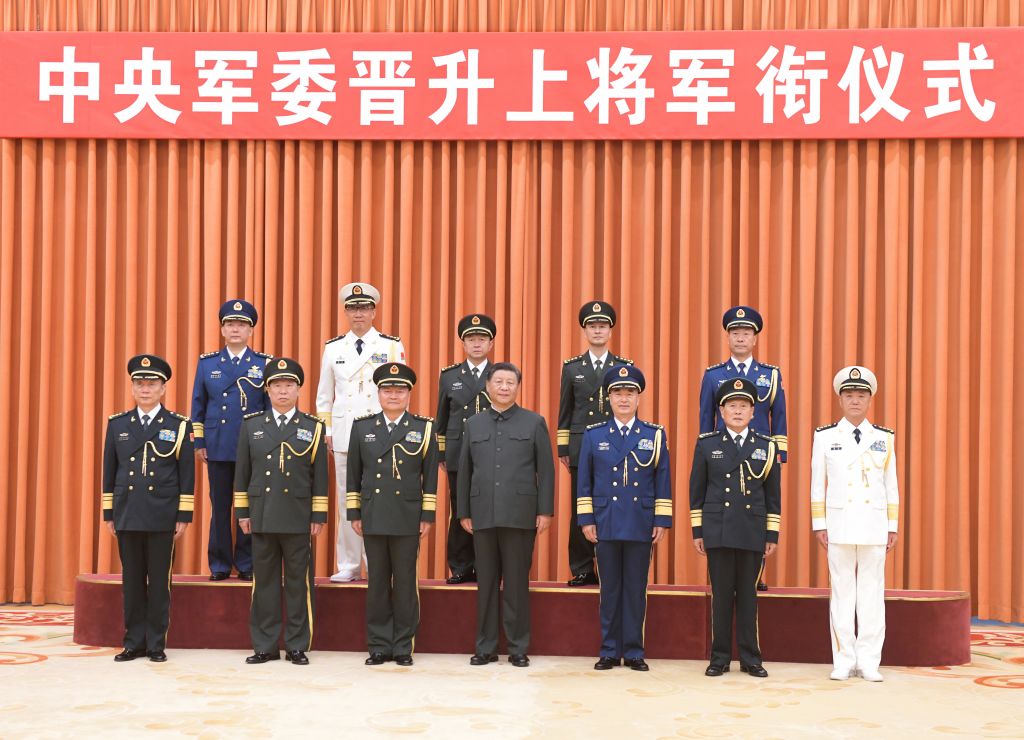
The careful selection by Chinese leader Xi Jinping of military officers for rapid promotion to key positions in the People’s Liberation Army may signal both a wish to consolidate the military behind him and a concern about emerging security challenges in China’s far western regions.
While the global focus in recent weeks has been on the US withdrawal from Afghanistan and then the announcement of the AUKUS pact, the PLA’s personnel dynamics are an important indicator of China’s geostrategic priorities and Xi’s political status that should not be ignored.
As chairman of the Central Military Commission, Xi has aimed to build what he’s called a ‘patron–client relationship’ by rapidly promoting young generals and putting them in important positions to win their loyalty, which can further strengthen his control of the military.
In July, Xi promoted four senior officers to general, the highest rank for officers in active service. It’s notable that Southern Theatre commander Wang Xiubin, Western Theatre commander Xu Qiling, Army commander Liu Zhenli and Strategic Support Force commander Ju Qiansheng are all from the army.
In September, Xi promoted five more generals, Western Theatre commander Wang Haijiang, Central Theatre commander Lin Xiangyang, PLA Navy commander Dong Jun, PLA Air Force commander Chang Dingqiu and National Defence University president Xu Xueqiang.
Despite the common view that China’s navy is the primary service being modernised, the Eastern and Southern Theatre Commands are the PLA’s strategic focus, and most of the recently promoted generals are from the army. Since 2016, when Xi began reforming the military, he has promoted 39 generals, 20 from the army, 10 from the air force, and only four from the navy.
There may be more vacancies in the army and air force because they assist other services such as the People’s Armed Police (PAP) and the Strategic Support Force (PLASSF). Most PAP generals come from the army, and PLASSF generals tend to have an air force background (see figure 1).
Figure 1: PLA promotions to general by service, 2016 to 2021

Generals from China’s western regions have been the most likely to be promoted. Since 2016, Xi has promoted 15 theatre commanders and theatre political commissars. Five generals were from the Western Command, three were from each of the Southern and Central Commands, and two were from the Eastern and Northern Commands (see figure 2).
Figure 2: PLA promotions to general by theatre command, 2016 to 2021

Six of the nine generals promoted in July and September rose from the rank of lieutenant general within two years. Seven were born after 1962, so they’ll be under 60 in 2022 after the Chinese Communist Party’s 20th national congress.
The selection of these officers is relevant to the military and regional security but also to the party.
The army still plays an important part in military modernisation due to its external strategic focus, its role in maintaining internal stability, and historical factors.
With its vast land borders, China has faced more disputes and threats on its northwestern frontier than from its southeastern maritime approaches since the imperial period.
These geostrategic and historical factors led imperial China to emphasise defending its western regions, and the PLA has had a traditional focus on land defence rather than coastal defence. Even as China has gradually expanded its maritime activities beyond the so-called first island chain, it still sees ensuring internal stability as a priority to keep the CCP in power.
Since the armed police were moved fully under the Central Military Commission’s control in 2018, there’s been deeper cooperation between the PLA and the PAP aimed at ensuring internal stability. This underscores the army’s importance in land defence during wartime and in strengthening the PAP in times of peace.
China’s Southern Theatre Command faces the possibility of disputes and conflict with regional countries in the South China Sea, but the Western Command is responsible for dealing with any possible external threat, such as from India, and internal instability in regions such as Xinjiang and Tibet.
That both Western Theatre commanders and political commissars are being selected for promotion suggests Beijing is focusing on emerging security challenges in its far western regions.
Media reporting notes that General Li Fengbiao is political commissar of the Western Command. That places a general in an important party position and strengthens the political commissar’s influence in the command.
For the CCP, ‘Political power grows out of the barrel of a gun’ (槍桿子出政權) is the iron rule left by Mao Zedong, and ‘The party commands the gun’ (黨指揮槍) has become a benchmark since then. Although Xi has successfully removed the previous power structure by cleaning up the ‘four big tigers’ with his military reforms, controlling the military is still the most important issue for him to ensure his political status in his third term.
If Xi can continue to dish out rapid promotions to generals he selects, beyond the PLA’s practice, that can help keep his political power and status relatively stable.
These developments, especially Xi’s focus on the Western Theatre Command, may mean he is placing a greater emphasis on meeting internal security threats than on any external conflict.
But Xi has pledged to resolve the Taiwan issue in his term as leader. If the instability in western China continues or escalates, he may respond to a more contested security outlook in East Asia by promoting rising nationalism to ease domestic pressure.
On the other hand, if China stabilises both relations with the West and the situation in Central Asia, Xi may be confident that he can fully focus on unifying Taiwan by 2027, which is the PLA’s 100th anniversary and the year of the 21st party congress.

